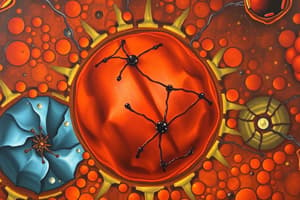Podcast
Questions and Answers
Which type of mutation is more likely to cause a major functional variation in the DNA sequence?
Which type of mutation is more likely to cause a major functional variation in the DNA sequence?
- Chromosomal duplications
- Single nucleotide mutations (correct)
- Chromosomal inversions
- Chromosomal deletions
Which genome typically exhibits greater ploidy levels, animals or plants?
Which genome typically exhibits greater ploidy levels, animals or plants?
- Animals because they have more SNP variants in their genomes.
- Plants because their genomes are more stable and less prone to errors.
- Animals because their genomes have multiple copies of each chromosome.
- Plants because they can withstand chromosomal changes better than animals. (correct)
What is the major difference between a transition and a transversion mutation?
What is the major difference between a transition and a transversion mutation?
- Transition mutations always lead to an increase in fitness, while transversion mutations decrease fitness.
- Transition mutations change the sequence of DNA more rapidly than transversion mutations.
- Transition mutations involve a change between purines and pyrimidines, while transversion mutations involve a substitution of a purine for a pyrimidine. (correct)
- Transition mutations involve multiple codons, while transversion mutations affect just one codon.
Which type of mutation is known to occur more rapidly, DNA or RNA mutations?
Which type of mutation is known to occur more rapidly, DNA or RNA mutations?
What does SNP stand for in genetics?
What does SNP stand for in genetics?
How is ploidy defined in terms of the number of sets of chromosomes present?
How is ploidy defined in terms of the number of sets of chromosomes present?
What is the term for a change in a single nucleotide in the DNA sequence?
What is the term for a change in a single nucleotide in the DNA sequence?
Which term refers to a change in a single nucleotide in the DNA sequence?
Which term refers to a change in a single nucleotide in the DNA sequence?
Which term describes the presence of an incorrect base pair in the DNA sequence?
Which term describes the presence of an incorrect base pair in the DNA sequence?
Which mutation type results in a premature stop codon?
Which mutation type results in a premature stop codon?
In animals, what can induce differential production of male and female offspring based on genotype and environment?
In animals, what can induce differential production of male and female offspring based on genotype and environment?
In genetics, what does 'ploidy' refer to?
In genetics, what does 'ploidy' refer to?
Which of the following mutations involves a change in the DNA sequence where one nucleotide is replaced with another?
Which of the following mutations involves a change in the DNA sequence where one nucleotide is replaced with another?
Which term describes the insertion or deletion of nucleotides in the DNA sequence?
Which term describes the insertion or deletion of nucleotides in the DNA sequence?
What is the term used for variations in the number of sets of chromosomes in an organism?
What is the term used for variations in the number of sets of chromosomes in an organism?
What is the term used for heritable changes that go beyond single nucleotide substitutions, like duplications or deletions?
What is the term used for heritable changes that go beyond single nucleotide substitutions, like duplications or deletions?
Which type of mutation is most likely to affect the amount of proteins produced by a gene?
Which type of mutation is most likely to affect the amount of proteins produced by a gene?
Flashcards are hidden until you start studying
Study Notes
Cell Conversion of Heritable Material into Protein
- Cells convert heritable material into protein through transcription and translation
Cell Expression of Proteins
- Cells of the same multicellular organism can express different proteins due to epigenetic changes
- This change can affect the expression of proteins
Indel Mutation Effects
- An "indel" (insertion or deletion) can affect multiple codons
- This can lead to changes in the amino acid sequence of a protein
Type of Mutation
- A C to a G mutation can be a transition or a transversion mutation
- Transition mutations occur between two bases with similar properties (e.g., purine to purine)
- Transversion mutations occur between two bases with different properties (e.g., purine to pyrimidine)
Point Mutations and Fitness
- Point mutations can increase or decrease fitness (an organism's ability to survive and reproduce)
- The effect of a mutation on fitness depends on the specific mutation and its context
SNP (Single Nucleotide Polymorphism)
- A SNP is a variation in a single nucleotide (A, C, G, or T) in a genome
- SNPs can affect gene function and are used in genetic studies
Single Nucleotide Variation Effects
- A small change in a single nucleotide can cause a functional variation in the DNA sequence
- This variation can affect gene expression and function
Major Outcomes of Mutations
- Chromosomal changes (deletions, duplications, inversions, translocations) create more major outcomes than single nucleotide mutations
- These changes can affect multiple genes and have significant effects on the organism
Mutation Rates
- DNA mutates more rapidly than RNA due to recombination errors
- This is why DNA is often used for genetic studies
Ploidy in Animals and Plants
- Plants can withstand multiple ploidy (having multiple sets of chromosomes) more easily than animals
- This is because plants have more flexibility in their cell division and gene expression
Human and Bacterial Genomes
- Human genomes are diploid (having two sets of chromosomes)
- Bacterial genomes are typically haploid (having one set of chromosomes)
Chromosomal Rearrangements
- Chromosomal rearrangements (deletions, duplications, inversions, translocations) can have significant effects on gene expression and function
- These rearrangements can lead to changes in the phenotype of an organism
Studying That Suits You
Use AI to generate personalized quizzes and flashcards to suit your learning preferences.



